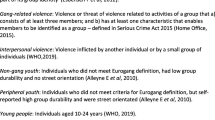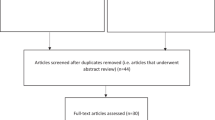Abstract
Background
The history of institutional care for individuals with intellectual disability is under-researched, complex and troubling.
Aims
To explore the experiences of women who may have had intellectual disability and/or mental illness and were admitted to forensic psychiatric care in early twentieth-century Ireland.
Methods
All female case records at the Central Mental Hospital, Dublin from 1910 to 1948 (n = 42) were studied for evidence of possible intellectual disability and a series of five cases is presented in detail.
Results
These committals occurred in the context of adverse social conditions, over-crowding in asylums and a belief that rates of mental illness were rising. Particular challenges included diagnostic issues (especially in relation to intellectual disability), adjustment to asylum environments, mental illness and physical ill-health.
Conclusions
The institutional experiences of individuals with intellectual disability represents an important area for further historical research, using larger and more varied forensic populations.

Similar content being viewed by others
References
Digby A (1996) Contexts and perspectives. In: Wright D, Digby A (eds) From idiocy to mental deficiency: historical perspectives on people with learning disabilities (studies in the social history of medicine). Routledge, London, pp 1–21
Atkinson D, Jackson M, Walmsley J (1997) Introduction: methods and themes. In: Atkinson D, Jackson M, Walmsley J (eds) Forgotten lives: exploring the history of learning disability. British Institute of Learning Disabilities (BILD). Worcestershire, UK, pp 1–20
Dale P, Melling J (2006) The politics of mental welfare: fresh perspectives on the history of institutional care for the mentally ill and disabled. In: Dale P, Melling J (eds) Mental Illness and Learning Disability: finding a place for mental disorder in the United Kingdom (Routledge Studies in the Social History of Medicine). Routledge, London, pp 1–23
Inspector of Lunatics (Ireland) (1893) The forty-second report (with appendices) of the Inspector of Lunatics (Ireland). Thom & Co./Her Majesty’s Stationery Office, Dublin
Michael P, Hirst D (1999) Establishing the ‘rule of kindness’: the foundation of the North Wales Lunatic Asylum, Denbeigh. In: Melling J, Forsythe B (eds) Insanity, institutions and society, 1800–1914: a social history of madness in comparative perspective (studies in the social history of medicine). Routledge, London, pp 159–179
Crompton F (2006) Needs and desires in the care of pauper lunatics: admissions to Worcester Asylum, 1852–72. In: Dale P, Melling J (eds) Mental illness and learning disability: finding a place for mental disorder in the united kingdom (routledge studies in the social history of medicine). Routledge, London, pp 46–64
Deb S, Thomas M, Bright C (2001) Mental disorder in adults with intellectual disability. I: Prevalence of functional psychiatric illness among a community-based population aged between 16 and 64 years. J Intellect Disabil Res 45:495–505
White P, Chant D, Edwards N, Townsend C, Waghorn G (2005) Prevalence of intellectual disability and comorbid mental illness in an Australian community sample. Aust NZJ Psychiatry 39:395–400
Holland T, Claire IC, Mukhopadhyay T (2002) Prevalence of criminal offending by men and women with intellectual disability and the characteristics of offenders: implications for research and service development. J Intellect Disabil Res 46(Suppl. 1):6–20
Johnston SJ (2002) Risk assessment in offenders with intellectual disability: the evidence base. J Intellect Disabil Res 46(Suppl. 1):47–56
Glaser W, Flood D (2004) Beyond specialist programmes: a study of the needs of offenders with intellectual disability requiring psychiatric attention. J Intellect Disabil Res 48:591–602
Lindsay WR, Smith AH, Quinn K, Anderson A, Smith A, Allan R, Law J (2004) Women with intellectual disability who have offended: characteristics and outcome. J Intellect Disabil Res 48:580–590
Riches VC, Parmenter TR, Wiese M, Stancliffe RJ (2006) Intellectual disability and mental illness in the NSW criminal justice system. Int J Law Psychiatry 29:386–396
Mulryan N, Gibbons P, O’Connor A (2002) Infanticide and child murder—admission to the Central Mental Hospital 1850–2000. Ir J Psychol Med 19:8–12
Kelly BD (2007) Murder, mercury, mental illness: infanticide in nineteenth-century Ireland. Ir J Med Sci 176:149–152
Smith C (1990) The Central Mental Hospital, Dundrum, Dublin. In: Bluglass R, Bowden P (eds) Principles and practice of forensic psychiatry. Churchill Livingstone, Edinburgh, pp 1351–1353
Fuller Torrey E, Miller J (2001) The invisible plague: the rise of mental illness from 1750 to the present. Rutgers University Press, NJ
Prior P (2003) Dangerous lunacy: the misuse of mental health law in nineteenth-century Ireland. J Forensic Psychiatr Psychol 14:525–541
Andrews J, Digby A (2004) Introduction: gender and class in the historiography of British and Irish psychiatry. Clio Med 73:7–44
Walsh O (2004) Gender and insanity in nineteenth-century Ireland. Clio Med 73:69–93
Anonymous (1861) Increase in insanity. Am J Insanity 18:95
Tuke DH (1894) Increase of insanity in Ireland. J Ment Sci 40:549–558
Gibbons P, Mulryan N, O’Connor A (1997) Guilty but insane: the insanity defence in Ireland, 1850–1995. Br J Psychiatry 170:467–472
Walsh E, Buchanan A, Fahy T (2001) Violence and schizophrenia: examining the evidence. Br J Psychiatry 180:490–495
Simmons HG (1978) Explaining social policy: the English Mental Deficiency Act of 1913. J Soc Hist 11:387–403
Conley CA (1995) No pedestals: women and violence in late nineteenth century Ireland. J Soc Hist 28:801–808
Kennedy L (1999) Bastardy and the great famine: Ireland, 1845–1850. Contin Chang 14:429–452
Jones G (1999) The campaign against tuberculosis in Ireland, 1899–1914. In: Malcolm E, Jones G (eds) Medicine, disease and the State in Ireland, 1650–1940. Cork University Press, Cork, pp 158–176
McCandless P (2003) Curative asylum, custodial hospital: the South Carolina Lunatic Asylum and State Hospital, 1828–1920. In: Porter R, Wright D (eds) The confinement of the insane: international perspectives, 1800–1965. Cambridge University Press, Cambridge, pp 173–192
Lyons FSL (1985) Ireland since the famine. Fontana, London
Breathnach CS, Moynihan JB (2003) An Irish statistician’s analysis of the national tuberculosis problem—Robert Charles Geary (1896–1983). Ir J Med Sci 172:149–153
Scull AT (1979) Museums of madness: the social organization of insanity in nineteenth-century England. Allen Lane, London
Walsh D, Daly A (2004) Mental illness in Ireland 1750–2002: reflections on the rise and fall of institutional care. Health Research Board, Dublin
Ireland WW (1885) The blot upon the brain. Bell & Bradfute, Edinburgh
Inspectors of Lunatics (1894) Special report from the Inspectors of Lunatics to the Chief Secretary: alleged increasing prevalence of insanity in Ireland. Her Majesty’s Stationery Office, Dublin
Gladstone D (1996) The changing dynamic of institutional care: The Western Counties Idiot Asylum, 1864–1914. In: Wright D, Digby A (eds) From idiocy to mental deficiency: historical perspectives on people with learning disabilities (studies in the social history of medicine). Routledge, London, pp 134–160
Jackson M (1996) Institutional provision for the feeble-minded in Edwardian England: Sandlebridge and the scientific morality of permanent care. In: Wright D, Digby A (eds) From idiocy to mental deficiency: historical perspectives on people with learning disabilities (studies in the social history of medicine). Routledge, London, pp 161–183
Egan M (2006) The ‘manufacture’ of mental defectives: Why the number of mental defectives increased in Scotland, 1857–1939. In: Dale P, Melling J (eds) Mental illness and learning disability: finding a place for mental disorder in the United Kingdom (Routledge studies in the social history of medicine). Routledge, London, pp 131–153
Finnane P (1981) Insanity and the insane in post-famine Ireland. Croon Helm, London
Fraser WI (2002) Forensic learning disabilities: the evidence base: executive summary. J Intellect Disabil Res 46(Suppl. 1):1–5
Acknowledgments
The author is grateful for the support of Professor Harry Kennedy (National Forensic Psychiatry Service, Central Mental Hospital, Dundrum, Dublin 14) and the comments of the anonymous peer-reviewer.
Author information
Authors and Affiliations
Corresponding author
Rights and permissions
About this article
Cite this article
Kelly, B.D. Intellectual disability, mental illness and offending behaviour: forensic cases from early twentieth-century Ireland. Ir J Med Sci 179, 409–416 (2010). https://doi.org/10.1007/s11845-008-0188-1
Received:
Accepted:
Published:
Issue Date:
DOI: https://doi.org/10.1007/s11845-008-0188-1




